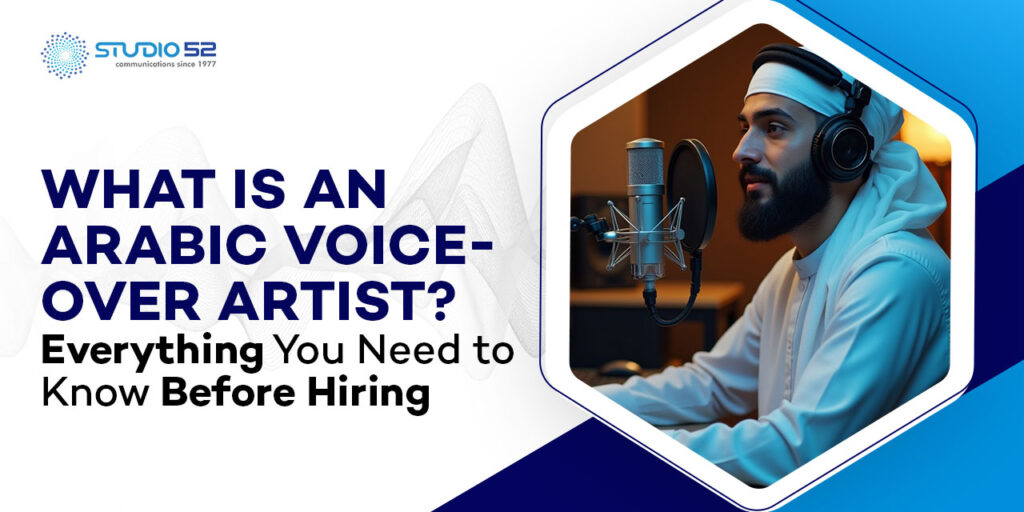The human voice is one of the most powerful tools for storytelling and communication. In the realm of multilingual media, where clarity and cultural relevance are key, Arabic voice-over artists play an essential role. With over 400 million Arabic speakers worldwide, the demand for native, dialect-specific voice talent continues to grow across sectors such as advertising, e-learning, telecom, and entertainment.
Studio52 has spent over four decades delivering professional Arabic voice-over services from its UAE-based production facilities. Through a combination of expert voice talent, high-end equipment, and deep regional knowledge, we help brands sound as powerful as they look.
Our team understands the nuances of various Arabic dialects—from Gulf to Levantine and North African—ensuring each voice-over resonates authentically with the target audience. Whether it’s a corporate narration, IVR system, animated video, or commercial campaign, we tailor every project with linguistic precision and cultural sensitivity.
At Studio52, we don’t just translate words—we bring meaning to life through voice, helping brands connect, engage, and leave a lasting impression in the Arabic-speaking world.
Table of Content
Who Is an Arabic Voice-Over Artist?
An Arabic voice-over artist is a trained professional who uses their voice to record scripted content in Arabic. This can range from Modern Standard Arabic (MSA) to various regional dialects such as Gulf (Khaleeji), Emirati, Egyptian, or Saudi. These artists are often the unseen, yet deeply impactful, voices behind:
• TV and radio commercials
• Corporate explainer videos
• IVR systems and phone menus
• E-learning modules
• Audiobooks and podcasts
• Documentaries and film dubbing
A skilled Arabic voice-over artist is more than just a fluent speaker. They are voice performers who understand tone, pacing, emotion, and cultural nuance—factors essential to making sure your message resonates with your target audience.
Beyond clarity and pronunciation, they bring life to the script, transforming plain text into an engaging auditory experience. They know how to shift their delivery based on audience demographics, content type, and intended impact.
From conveying urgency in an advertisement to offering calm instruction in training modules, their ability to adapt makes them invaluable. Investing in a professional Arabic voice-over isn’t just about language—it’s about connection, credibility, and leaving a lasting impression through sound.
Pro Tip 1: Always match the dialect to your audience – Misused dialects can reduce clarity and trust.
Why Hiring the Right Arabic Voice-Over Artist Matters
Hiring a qualified Arabic voice-over artist ensures clarity, emotional depth, and audience connection. Mispronunciations or mismatched dialects can disrupt the listener’s experience and dilute your brand’s credibility. For example, a product advertisement intended for the Gulf market would sound disconnected if delivered in an Egyptian dialect.
Voice is a brand’s audible identity. Just as logos and color schemes define visual branding, voice tone and style shape audio branding. Our team handpicks voice-over talents to match your brand persona—whether it’s authoritative, friendly, professional, or upbeat.
The right tone of voice can change how people see you, help them trust you, and make it easier for them to remember what you say. It’s not just about how words are spoken, but how they’re felt by the listener. A relatable tone can turn passive listeners into engaged audiences. Our artists don’t just read scripts—they interpret them with intent, empathy, and nuance.
From pacing and inflection to emotional resonance, every element is tailored to your goals. In a multilingual, multicultural landscape, the right Arabic voice-over bridges gaps, reinforces brand consistency, and helps your content stand out in an increasingly noisy digital world.
Arabic: A Language of Dialects and Distinctions
Arabic is not a monolithic language; it varies greatly from region to region. The key dialects commonly used in voice-over projects include:
A. Modern Standard Arabic (MSA): Used in news broadcasts, official communications, and educational material.
B. Gulf Arabic (Khaleeji): This type of Arabic is spoken in countries like the UAE, Saudi Arabia, Bahrain, Kuwait, Qatar, and Oman.
C. Egyptian Arabic: Highly popular in media and widely understood across the Arab world.
D. Levantine Arabic: Common in Lebanon, Jordan, Palestine, and Syria.
Choosing the correct dialect is crucial. We consult with clients to identify their audience demographics and select the most appropriate dialect and voice actor.
Each dialect has its own special cultural meaning and feelings. Using the right one not only improves comprehension but also builds trust and relatability with your audience. A mismatch in dialect can lead to confusion, reduced impact, or even alienation. For example, an Emirati listener may find a Levantine dialect unfamiliar or less persuasive.
We ensure linguistic accuracy and cultural sensitivity in every voice-over. By aligning your message with your audience’s spoken language, we help your brand connect authentically and effectively, making your content more engaging, memorable, and persuasive across Arab-speaking regions.
What Makes a Great Arabic Voice-Over Artist?
Here are the main qualities we want and provide:
A. Native Fluency: Native speakers naturally capture pronunciation, rhythm, and cultural nuances, making the delivery more authentic and relatable to listeners.
- Vocal Range & Flexibility: Skilled voice artists adjust tone, pitch, and tempo to suit various moods, genres, and audience expectations with precision.
- Emotional Intelligence: They sense script emotions accurately, expressing them subtly to enhance impact without sounding forced, exaggerated, or disconnected from the message.
- Script Interpretation Skills: Proficient voice talent quickly understands a script’s purpose, rhythm, and emphasis, ensuring a coherent and engaging vocal performance.
- Technical Proficiency: Experience with studio equipment and taking direction ensures smooth recordings, clean audio, and fewer retakes during professional sessions.
Our in-house voice directors and sound engineers work closely with artists to ensure the best possible delivery.
Studio52: Your One-Stop Arabic Voice-Over Solution
When you partner with our team, you’re not just hiring a voice—you’re gaining access to a full-service audio production ecosystem. Here’s what sets our work apart:
- State-of-the-Art Recording Studios: Our UAE studios are acoustically treated and fully equipped to deliver clean, professional-grade voice recordings every time.
- Wide Range of Arabic Dialects: We offer expert voiceovers in MSA, Gulf, Emirati, Saudi, Egyptian, and other regional dialects with cultural accuracy.
- Professional Editing and Mastering: Your audio is polished through meticulous editing, leveling, and mastering to ensure clarity, consistency, and broadcast-level sound quality.
- Turnkey Solutions: We manage everything from script development to delivery, providing a seamless, all-in-one voiceover service under one roof.
- Client-Centric Process: Our workflow ensures fast turnaround, consistent quality, and flexible packages tailored to each client’s unique needs and expectations.
Thousands of successful voice-over projects across industries like banking, healthcare, hospitality, government, and education stand as testimony to our commitment.
How to Choose the Right Arabic Voice-Over Artist for Your Project
Before hiring, consider these key factors:
- Project Type: Specify whether the voiceover is for a commercial, e-learning course, corporate narration, or another specific media format.
- Target Audience: Identify the target region and audience to choose the most suitable Arabic dialect and cultural tone for your project.
- Voice Tone: Decide if the voice should sound friendly, confident, playful, calm, or formal to match the message and audience expectations.
- Gender and Age of Voice: Select whether you need a male or female voice, and choose between youthful energy or mature, experienced delivery style.
- Budget and Timeline: Outline your timeframe and budget constraints upfront to receive realistic quotes and efficient delivery without compromising on quality.
We simplify this process by offering curated voice samples and expert consultations to help you find the ideal voice talent.
Industries That Benefit Most from Arabic Voice-Overs
Arabic voice-over is in high demand across many sectors:
- Telecommunications: IVR and customer support systems
- Healthcare: Patient instructions, medical training modules
- E-Learning: Course narration, test preparation
- Retail & E-commerce: Product videos, marketing content
- Finance: Banking tutorials, service explanations
- Government & Public Services: Public announcements, awareness campaigns
Each of these industries benefits from localized, culturally relevant audio communication—an area where our expertise shines.
Pro Tip 2: Choose emotion and tone carefully – A voice that suits your message can turn listeners into loyal customers.
Industry Insights: The Power of Voice in the Arab Market
IAB MENA says that digital ad spending in the region recently grew to $6.95 billion. That’s a 19.8% increase from the year before, making MENA one of the top five biggest markets in EMEA.
Notably, Saudi Arabia outpaced the regional average with a 23.5% growth rate, while search advertising grew by 24.7%, driven in part by emerging channels like retail media.
With a long-standing presence in the region, our team is uniquely positioned to meet this growing demand. We understand both the technical and cultural dimensions of Arabic voice-over work, helping businesses truly connect with their audiences.
Our Process: How We Work
- Client Briefing: We begin by collecting key details about the script, audience, tone, language, and delivery expectations for smooth execution.
- Voice Talent Selection: A customized shortlist of voice samples is shared, allowing clients to choose the ideal voice that matches their creative vision.
- Recording Session: Voiceover is recorded in a professional studio environment, with real-time client direction to ensure accurate tone and message alignment.
- Editing & Mastering: Skilled audio engineers refine the raw recording, ensuring clarity, consistency, and professional-quality sound tailored to your project needs.
- Delivery & Feedback: Final audio files are delivered in your requested format, with room for revisions based on your review and feedback.
Our streamlined process ensures fast turnaround and impeccable quality—a hallmark of our service.
Final Thoughts: The Voice of Arabic Excellence
First impressions are often made through sound, and the voice you choose becomes your brand’s vocal handshake. Don’t settle for generic or mismatched audio. Whether you’re building a regional brand presence or communicating with diverse Arabic-speaking audiences, your message deserves the right voice.
Our team combines linguistic expertise, audio engineering excellence, and decades of experience to deliver Arabic voice-overs that resonate, engage, and inspire.
Every project begins with understanding your brand’s essence, audience, and message. We don’t just provide voices—Studio52 curates voices that align with your values and vision. From Modern Standard Arabic to region-specific dialects, our voice talents bring cultural authenticity and emotional depth to each recording.
Paired with industry-grade studios and expert post-production, we ensure your final audio is crisp, clear, and compelling. Whether it’s a high-energy commercial or a calm e-learning script, we help your message make a lasting impact—because sound isn’t just heard, it’s felt.
Frequently Asked Questions About Arabic Voice-Over Services
Q1: Can you match a specific dialect or accent?
Yes, we provide professional voice talents fluent in a variety of Arabic dialects, including Gulf, Egyptian, Levantine, and Modern Standard Arabic. Our experts will guide you in selecting the right dialect based on your audience, region, and the emotional tone your message needs to convey.
Q2: What if I need help writing or translating my script?
We offer comprehensive scriptwriting and Arabic translation services. Our linguists ensure that the translated text is culturally appropriate, phonetically optimized for voice delivery, and aligned with the purpose of your content, whether it’s for marketing, narration, or customer communication.
Q3: What file formats do you provide?
We work with all popular audio formats like MP3, WAV, and AIFF. Depending on your production needs and platform requirements, we can deliver high-quality mastered audio files in your preferred format, ensuring seamless integration with your existing media.
Q4: How long does the process take?
Project timelines vary depending on script length and complexity, but most voice-over jobs are completed within 3 to 5 business days. Urgent requests can be accommodated with priority scheduling, ensuring timely delivery without compromising on recording and post-production quality.
Q5: Can I request revisions?
Yes, we offer revisions to ensure client satisfaction. Feedback is welcome at every stage, and we make necessary adjustments to tone, pace, or pronunciation as needed. Our goal is to deliver an end product that aligns perfectly with your vision and expectations.



